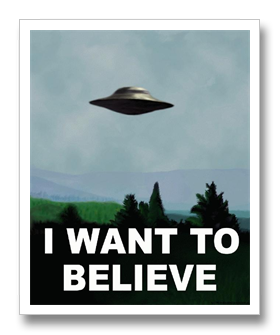“Nothing disappears without a trace.” – Albert Hosteen.
ANASAZI [Mythology] Aired May 19, 1995
Episode: 2×25 / 49 Overall
Director: R.W. Goodwin • Writer: Chris Carter & David Duchovny
Mulder receives an encrypted computer disk containing the defense department’s top secret files on extraterrestrial life.
Alternate tagline: ‘Éí ‘Aaníígóó ‘Áhoot’é‘, which is Navajo for ‘The Truth is Out There’.
Carter worked closely with Duchovny to develop the story for the final episode of season 2, the first of a three-part story arc that continues in to season 3. Carter was apparently pleased with the way the finale posed more questions than it answered and this is certainly a trademark of most mythology episodes. While the standalone shows would often vary in many aspects; tone, rhythm, pacing and so on, the myth-arc entries almost all share a very similar structure, and one aspect of this is that they often featured quite densely layered plots, attempting to cover a lot of ground in limited time period. Early on these episodes were few and far between so you get the sense that when they did venture into mythology territory that they worked hard to make the most of it. This method achieves varying effects. For one, they can rarely be described as boring, moving swiftly from scene to scene with frantic urgency, teasing the reveal of a course changing revelation, though admittedly never quite satisfying our desire for the infamous ‘truth’. Arguably an intentional effect, attempting, and often succeeding, at keeping us baited but never fully content that we’ve been given the whole story. And herein lies the root of their undoing. This obsessive desire to cover so much ground while persisting to hold back on ever answering the big questions unfortunately resulted in as much, if not more, frustration as fulfillment. Looking forward, it’s clear that the series weaved itself in to tangled mess of loose ends and while it’s certainly possible to stand back and construct some overall sense of structure, it still demands a lot from the viewer in the process. While it’s easy to criticise the mythology arcs when looking at the big picture in retrospect, it’s important to attempt to take each episode on its own merits, regardless if the end doesn’t quite match up perfectly with what was set in place in these early stages. With that in mind, ‘Anasazi’ is undoubtably an enjoyable episode that ends on what could be called the series greatest cliffhanger, the apparent death of Mulder.
This isn’t the only time the series teased the possible demise of Mulder, however at this stage after only two seasons it would have been possible to convince audiences that the character may in fact not return for future episodes. The future of the series was undetermined and really could have gone in any number of directions. The apparent death of Mulder brought a lot of interest to the show and succeeded in keeping the fan base on board for the next installment. The writer’s also shocked audiences with the sudden death of Bill Mulder, whom we had only just begun to get to know. Carter has been quoted as saying that this turn of events proved that ‘anything could happen in the X-Files’ and to this end the plot device served its purpose. This also laid the groundwork for Mulder’s hatred for Krycek which will hold strong throughout the coming seasons.
The art department had their work cut out for them with the re-creation of the New Mexico environment. As it was too difficult and expensive to fly the crew to the location, 16,000 gallons of red paint were used to transform a rock quarry in Vancouver in to a believable New Mexico location. The painted rocks were then combined with images shot in New Mexico to achieve the final result, which all things considered is nothing short of spectacular. Duchovny pulls in a compelling performance as he gradually shifts in to a more agitated state due to the contaminated water. It’s a subtle direction at first, which is almost imperceptible, but progressively builds at a steady rate throughout the show and is one of the episode’s strong points. It’s a pity Scully doesn’t have more to do but this is a very Mulder-centric story that’s being told, which is fine as it works well. Carter himself makes his first cameo on the show as an agent interrogating Scully in Skinner’s office. The impact of the final moments is certainly lost over time since we’re all very aware that Mulder doesn’t die in the train car, however it doesn’t take away from the initial effect this would have had on first time viewers. In many ways this feels like the beginning of a story arc more than a season finale. While tantalizingly frustrating in 1995, thankfully we now have the luxury of DVD to propel us forward and skip the agonizing months of waiting for the next season.
★★★☆☆

